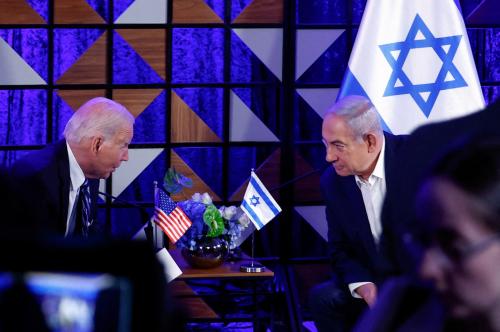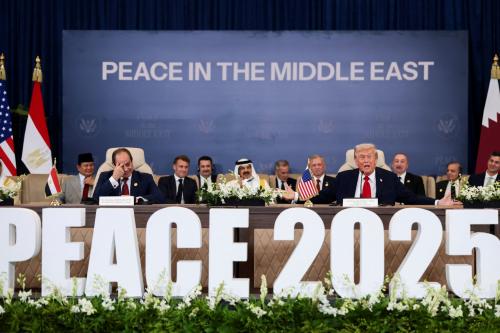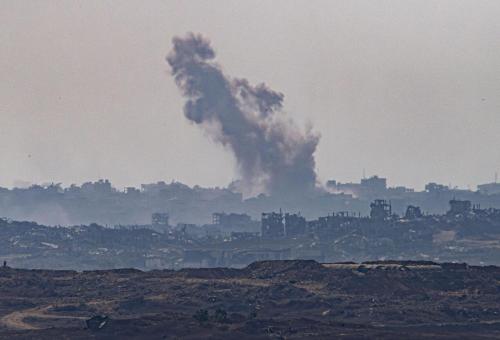The Biden administration’s decision on March 25 not to veto a United Nations Security Council resolution calling for a cease-fire in Gaza brought the tension between the Biden administration and the Netanyahu government to a new high. On October 7 after Hamas’s horrific terrorist attack, the administration, and President Joe Biden personally, extended remarkable support to Israel, but as the war lingered (it will soon reach the six-month mark) significant disagreements emerged. They have to do with issues ranging from the war’s end, “the day after,” and the geopolitics of the Middle East, to the acute humanitarian crisis in Gaza and Israel’s prospective attack on Hamas’s remaining forces in Rafah, where over a million displaced people are currently sheltering.
Underlying the policy differences is the bad personal relationship between Biden and Benjamin Netanyahu, and Netanyahu’s calculated willingness to confront rather than accommodate his American counterpart. This was a strident reversal of Israeli prime ministers’ long-held tradition to avoid head-on collisions with U.S. presidents. Netanyahu first collided with former President Barack Obama and has taken it further with Biden during the past few months. Biden has been critical of Netanyahu and his extreme right-wing coalition since the formation of the latter’s current government. Biden viewed Netanyahu’s “judicial reform” as an attack on Israel’s democratic system and refused to invite him to Washington. They finally met in New York around the U.N. General Assembly in September 2023 and discussed, among other things, Biden’s quest to normalize relations between Saudi Arabia and Israel in tandem with the upgrading of the U.S.-Saudi relationship. Given Russia, China, and Iran’s challenge to the U.S. position in the Middle East, Saudi-Israeli normalization would be a crucial step in the formation of a pro-American bloc of moderate Arab states and Israel.
These issues were temporarily overshadowed by the events of October 7. But as the war unfolded, the same issues returned to the agenda, modified by the war. In the Biden administration’s view, after the war’s end, Gaza, following a transitional period, should be governed and administered by a revitalized and reformed Palestinian Authority (PA). Israel and the PA should then resume negotiations on a final status solution culminating in a two-state solution. This should enable the Saudis and the Emiratis to finance Gaza’s reconstruction and for the Saudis to normalize their relations with Israel. The role played by Iran’s proxies in the Israel-Hamas war served to highlight the need to construct that pro-Western anti-Iranian coalition. This vision is unacceptable to Netanyahu, who knows that his right-wing partners would topple his government if he accepted the two-state solution formula.
Contextualizing today’s crisis
This crisis’s significance should be seen against the backdrop of several earlier crises in the U.S.-Israeli relationship.
In 1957, U.S. President Dwight Eisenhower’s administration forced Israel to withdraw from the Sinai Peninsula in the aftermath of the Suez-Sinai campaign. Israel’s leader, David Ben-Gurion, capitulated to U.S. pressure and agreed to withdraw in return for arrangements made for the Sinai and Israel’s freedom of passage in the Straits of Tiran, a gateway to Israel’s Port of Eilat, on the Red Sea.
In 1962-1963, President John. F. Kennedy exerted massive pressure on Ben-Gurion’s government over Washington’s suspicions that Israel was developing nuclear weapons in the southern town of Dimona. The pressures were tacit but consequential. The nuclear issue as such remained on the U.S.-Israeli agenda until a mutually acceptable formula was worked out with President Richard Nixon and Henry Kissinger in the early 1970s.
In 1973, following the initial setback sustained by Israel during the Egyptian-Syrian attack on October 6, the United States, after a short delay, provided Israel with massive military aid and diplomatic support. By October 22 that year, the United States, pressured by the Soviet Union and Arab states, began to insist that Israel agree to a cease-fire and refrain from completely destroying the Egyptian army. Alongside the Soviet and Arab concerns, Kissinger wanted to avoid a complete Egyptian defeat, allowing Cairo to transition from war to negotiations from a position of strength. This created tension in the American-Israeli relationship but in retrospect, Israelis came to realize the benefits of U.S. policies that laid the foundations for a peace process that culminated six years later in the Egyptian-Israeli peace treaty.
In 1974-1975, Kissinger conducted his shuttle diplomacy which led to cease-fire and disengagement agreements between Israel, Egypt, and Syria and to the Israeli-Egyptian interim agreement of September 1975. During these negotiations, tension arose several times between Kissinger and the Israeli negotiators over concessions that Israel had to make. The most acute crisis in this series of disagreements occurred in 1975 between Kissinger and Israeli Prime Minister Yitzhak Rabin. In the course of that crisis, President Gerald Ford, at Kissinger’s request, announced “a reassessment” of U.S.-Israeli relations, after which Rabin accepted most of Kissinger’s demands and a significant agreement with Egypt was eventually signed.
In January 1977, President Jimmy Carter launched an ambitious quest to resolve the Arab-Israeli conflict in cooperation with the Soviet Union. His policy envisaged Arab-Israeli peace in return for a full Israeli withdrawal from the territories it captured in 1967 and the establishment of a Palestinian state. This led to a head-on collision between Carter and Rabin. A few months later, Menachem Begin was elected as Israel’s prime minister at the head of a right-wing government. He was bitterly opposed to Carter’s policies but so was Egyptian President Anwar Sadat, and the two ended up reaching an agreement on what became the first Arab-Israeli peace treaty outside of Carter’s framework. After an initially cold response to this new trend, the Carter administration endorsed the Egyptian-Israeli dialogue and brought it to fruition at the Camp David summit in September 1978. The process of negotiating the agreement and subsequently implementing the Palestinian dimension of the Israeli-Egyptian peace treaty led to repeated Israeli-American frictions, but these did not develop into a major crisis.
In its final years, the administration of President George H.W. Bush and James Baker, his secretary of state, sought to promote an Israeli-Palestinian agreement. The administration was openly critical of the Yitzhak Shamir government’s failure to respond to its initiatives and to Israel’s policy of building new settlements in the West Bank. The policy’s practical aspect was Bush’s refusal to approve $10 billion in loan guarantees to Israel designated to help integrate the new wave of Russian-Jewish immigration. Shamir’s failure to manage his relationship with the Bush administration partly explains his defeat by Rabin in the parliamentary elections in 1992.
Rabin’s second term, coming back to power after Shamir, set the stage for the most optimistic period in the effort to formulate and implement a comprehensive Arab-Israeli peace process. This occurred during the final months of the George H.W. Bush administration and during Bill Clinton’s presidency. Under Rabin, his successor Shimon Peres, and later Ehud Barak, all of whom wanted to move the peace process forward, close cooperation with the United States was common, despite occasional disagreements over tactical issues.
Obama’s presidency and Netanyahu’s return to power coincided in early 2009, and it led to profound and open disagreements over both the Palestinian issue and Iran’s quest for nuclear weapons. Obama was determined to resolve the Israeli-Palestinian conflict and successfully pressured Netanyahu to publicly accept the notion of a two-state solution, which he did in a speech at Bar Ilan University. However, they ended up in a public and bitter disagreement, which culminated in Netanyahu’s decision to criticize Obama’s policy toward Iran in a speech to a joint session of Congress in March 2015. This did not prevent the signing of the Joint Comprehensive Plan of Action, but after Donald Trump’s election to the presidency, Netanyahu played a role in his decision to withdraw from it.
Netanyahu’s decision to take on the U.S. president in Congress represented a sharp change in the paradigm mentioned above. Unlike most of his predecessors, Netanyahu did not mind openly quarreling with the president of the United States, but actually saw a political advantage in it and was not penalized by Israeli public opinion for it. In the United States, however, Netanyahu’s policies led to the perception that Israel had abandoned its policy of bipartisanship in American politics and shifted toward reliance on the Republican Party. This resulted in significant criticism of Israel in the Democratic ranks.
What makes today’s crisis different
Against this backdrop, the current crisis in the U.S.-Israeli relationship is very severe. It is reminiscent of the October War’s end in 1973, when a U.S. administration, having helped Israel transform an initial setback into a victory, sought to use the war’s ambiguous outcome as the starting point for transformative regional diplomacy. But a similar transition from war to a new diplomatic order is currently not in the cards.
Washington and Jerusalem’s profound policy differences are compounded by Biden and Netanyahu’s negative personal relationship. The Biden administration seems to believe that a change in government and prime minister in Israel is essential for the conduct of effective U.S. policy and a shift to a new regional order. Netanyahu, in turn, is clearly interested in an open confrontation with Biden, regarding it as an asset in his quest to survive Israel’s domestic political crisis. Worse, both parties are now openly interfering in each other’s domestic politics. Netanyahu abandoned a long-standing policy of working with both sides of the aisle and is leaning heavily on the Republicans, while Biden and his allies openly or implicitly express an expectation to see a new prime minister and government in Israel.
The Brookings Institution is committed to quality, independence, and impact.
We are supported by a diverse array of funders. In line with our values and policies, each Brookings publication represents the sole views of its author(s).








Commentary
Biden and Netanyahu: A crisis in perspective
April 2, 2024